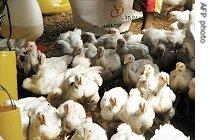2007年VOA标准英语-Indonesia Stops Sharing Bird Flu Samples(在线收听)
Jakarta
07 February 2007
The Indonesian government has announced it is withholding samples of a deadly bird flu virus in light of its new partnership to develop a vaccine with a U.S. drug company. As Chad Bouchard reports from Jakarta, the move may hamper efforts by other countries to develop vaccines to prevent a possible worldwide bird flu pandemic.
 |
| Chickens on a farm in central Java, Indonesia (file photo) |
But since late last year, when the deal with Baxter began to take shape, the country has been refusing to share samples of the local strain of the H5N1 bird flu virus with foreign laboratories, or with the World Health Organization.
Indonesia did not say why it is withholding samples of the virus. But it, Thailand, and other developing countries have expressed concern that their H5N1 samples will be sent to Western nations, and used there to develop vaccines that citizens of the originating country won't be able to afford.
WHO spokesman Dick Thompson says contributing samples to the organization's database is entirely voluntary, and it is not yet clear how Indonesia's memorandum of understanding, or MOU, will affect the worldwide search for a vaccine against H5N1.
"We fully support the right of Indonesia or any other country to pursue an agreement with a vaccine company. But that is not the issue," he said. "Until the details and the effect of the MOU are better understood it's not going to be possible for us to determine how this agreement will affect the functioning of the global influenza surveillance program."
Officials of the drug company, Baxter, have indicated the agreement with Indonesia does not require the country to withhold samples of the virus. Indonesia says it might make samples available in the future.
The H5N1 virus has been found in poultry all over the world, and has killed 166 people over the past four years. Outbreaks in Indonesia have accounted for about a third of the human deaths.
The H5N1 virus still affects primarily birds, but epidemiologists fear the disease might mutate into a form that can be passed easily from human to human, which could trigger a pandemic that could threaten millions of people.
Thompson says samples sent from different countries help scientists track the evolution of the virus, and prepare for a possible pandemic.
"This a virus that mutates constantly, and it's important for us to get access to these viruses right away so we can understand how it's evolving. Secondly, by having access to the virus, we are able to validate the diagnostic laboratory capabilities of the countries involved, so we are able to look and very often confirm that the results from a national laboratory are accurate," said Thompson.
Bird flu has re-emerged in several countries since the beginning of the year, including Vietnam, Thailand, and Japan. If a pandemic strain should develop, experts say it could take up to six months for researchers to find a vaccine that would fully protect against the disease.